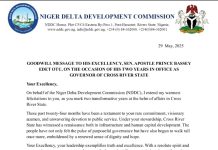
By Efio-Ita Nyok |18 June 2015 |5:11am
Recently, World Bank declared that 66% of Nigeria's over 170 million population was living under the poverty line of $1.22 daily. It was in view of this stark economic reality that President Buhari in his 2015 Presidential campaigns promised to pay the sum of N5,000 to Nigeria's poorest segment of society. That is to say, the sum of N5,000 maybe paid to these 122 million lot. Despite the nobleness of this programme, it's appears that our public office holders may not actually understand the implication(s) of such a declaration this foremost economic institution. Consequently, it has become imperative for me to articulate a handful of opinions in this direction.
Economically speaking, there are three economic classes in every society, and Nigeria is not left out in this classification. You must have heard that we have the: Poor, Middle Class, and Rich.
The 'poor' may simply refer to those who cannot conveniently, via their income, live above the poverty line of $1.22 daily. That is, they may not be able to provide the basic necessities of life, to wit, 'food, shelter and clothing' among others, for themselves. In the distant past, academically inferring, the poor were elementary/primary education graduates. However, Robert Kiyosaki would say these lot are in the Employee(E) segment of the Cash-flow quadrant. On the other hand, the Middle Class can afford the basic necessities of life like -food, shelter and clothing. In other words, they live above the poverty line of $1.22 a day. Educationally, in distant past, they maybe said to be High/Secondary school graduates. But today, they are tertiary institutions graduates. They are also in Kiyosaki's E segment, but some of them are in the S segment of his Cash-flow quadrant. Finally, the Rich are in Robert Kiyosaki's B and I quadrants. They are owners of Big businesses(employing over 500 employees) and investors. In short, they are the entrepreneurs as well as capitalists.
According to Robert Kiyosaki, the much respected American finance educator, investor, business owner and author, the basic difference between 'the rich' on the one hand, and 'the poor and middle class' on the other hand, is that the rich who occupies Kiyosaki's Business Owner and Investor(B & S) segment of the cash-flow quadrant "don't work for money", whereas the poor and middle class "work for money". The rich are not looking for paychecks unlike the poor and middle class.
According to the World Bank report, the economic class called 'the poor' have gulped 112 million Nigerians. We don't know where the middle class and the rich are in terms of population. As usual, the rich may be the 1% of the population, that is, 170, 000(could this be true!?). That is to say hypothetically, Nigeria's middle class may be the remaining 35%. Meaning, we may have about 57 million Nigerians who are in the economic middle class.
In view of the subject under review, the responsibility of government the world over is to evolve measures that would improve on the fortunes of especially the poor and middle class. Accordingly, responsible government churn out policies that would move its citizenry from the economic classes in upward review. That is, its citizens in the poor class should proceed to the middle class and the middle class advances to the class of the rich. Conversely stated, the Nigerian government should not maintain the 112 million Nigerians in the poor cadre. They should rather initiate policies that would transport the poor into the middle class. That is what government around the world, especially in first world societies embark on.
Any economist would agree with me that a sound economy is such that has its middle class bulging, that is, the population of its citizenry is high in the middle class than in the poor and/or rich classes. The rich class is always smaller followed by the poor.
That we have 112 million poor Nigerians and hypothetically about 57 million middle class, that is, about 169 million Nigerians, suggest very strongly that our economy is week and we have a gross majority of Nigerians who lack proper economic education. We have a gross majority of Nigerians who 'work for money' instead of causing 'money work for them'.
In very specific terms, the Buhari/Osibanjo administration should rather embark on increasing the population of Nigeria's middle class by embarking on an educational policy that confers a high degree of entrepreneurial spirit on Nigerians. Giving N5,000 to the poor is quite sympathetic but not as sympathetic as equipping them with an entrepreneurial temper.
Let's be rational but not emotional in policy initiation and execution.









